There are tests that are put off until the last minute. When a majority of British voters backed Boris Johnson in 2019, the mirage of an unfinished Brexit put on hold the urgency of analysing the previous years of conservative governments, who had been occupying Downing Street for almost a decade. This Thursday has become the moment to take stock. Almost 50 million Britons are called to the polls, and all the polls suggest that the result will lead to the end of a cycle.
For more than a year now, Labour has consistently held an average lead of 20 percentage points over the Conservative Party in all polls.
Rishi Sunak decided to bring forward the elections six weeks ago, when the general consensus in the United Kingdom was that they would be held in the autumn. Nobody understood the reasons behind this announcement. The inflation figures were beginning to improve, and the first months of the year showed an economy that, albeit timidly, was beginning to grow. The Prime Minister was aware that it was almost impossible to turn the polls around, and probably, some experts suggested, he used the element of surprise as a last resort, hoping to be able to take the initiative in the political debate from the first minute.
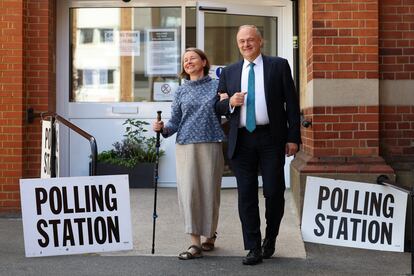
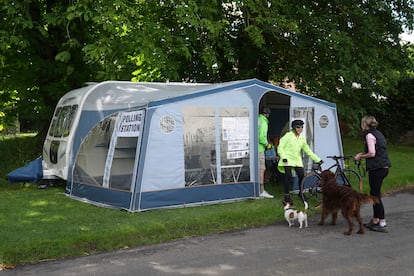
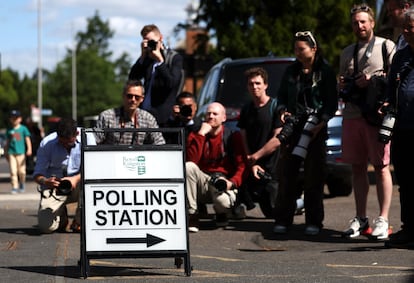
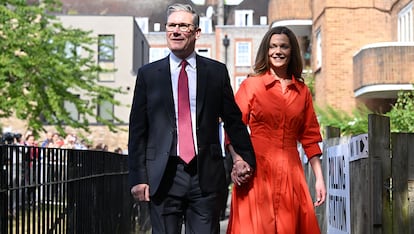
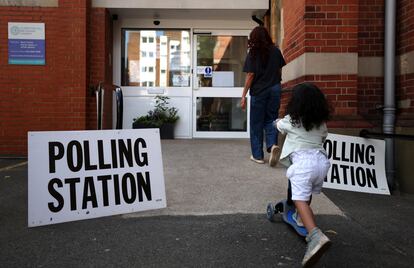
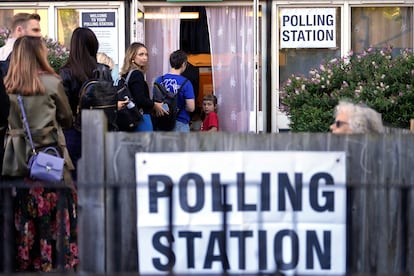

Scott Heppell (AP)

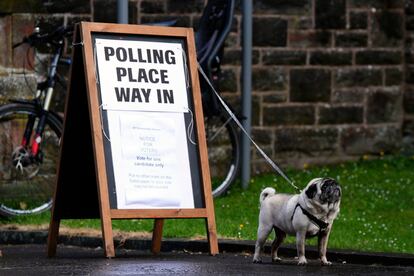
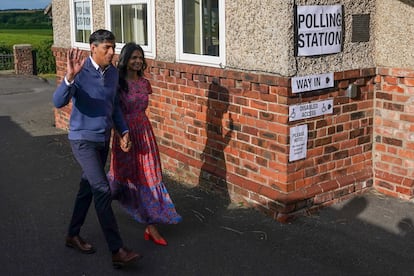
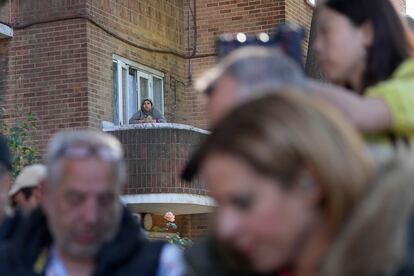

The British will deliver their verdict throughout the day on David Cameron’s years of austerity; Theresa May and Boris Johnson’s disastrous handling of Brexit; the scandal of the partygate during the pandemic or the economic crisis caused during Liz Truss’s brief mandate. Sunak has become the scapegoat for a general weariness with the party, although he will also purge his own mistakes. Among them, an electoral campaign erratic in strategy and confusing in discourse.
A long election day
Knowing what’s happening outside means understanding what’s going to happen inside, so don’t miss anything.
KEEP READING
The British will vote in 650 constituencies, which will produce the same number of seats for the House of Commons at the end of the day. Under the majoritarian system in force in the United Kingdom (England, Wales, Scotland and Northern Ireland), the candidate with the most votes in each constituency wins the seat in question. The rest of the ballots destined for other parties end up in the trash.
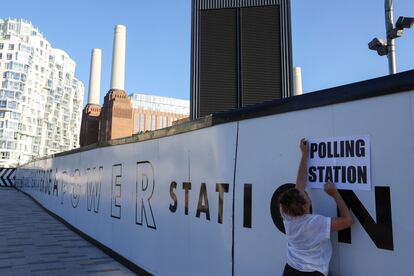
Polling stations will open at 7am and close at 10pm (one hour later in mainland Spain). British citizens are not required to carry a national identity document, but they must present some form of identification such as a passport or driving licence at the polling station.
Starting at 10:00 p.m., the ballot boxes are transported to the counting center in the area. These are usually sports halls, pavilions or large spaces on which a large number of long tables are distributed, where electoral agents, officials and observers of the parties will begin to count ballots.
From 5:00 on Friday (6:00 in Spanish mainland time), we will begin to have a rough idea of the distribution of seats and which party will govern the United Kingdom.
However, at 10pm, as soon as the polling stations close, the BBC, ITV and Sky will publish the exit poll that has been carried out for years by the prestigious sociologists John Curtice and David Firth, who place 130 extra ballot boxes in carefully selected polling stations to provide predictions that, in the last five elections, have had a margin of error of 1.5-7.5 seats.
The ‘Farage factor’
One of the reasons Sunak decided to call early elections was to catch the populist Nigel Farage off guard. Over the past decade, through various political parties, he has been a factor in the distortion of conservative ranks and the reason the party has swung further and further to the right. Farage had decided to get involved in the US presidential campaign and help his friend Donald Trump. And Reform UK, the organisation he helped found, did not yet have a sufficient territorial presence at the time of the early elections.
However, although he initially said he would not stand, he thought twice. Something led the character – a mix of politician, communicator and mass agitator – to suspect that this could be his last chance, after having stood up to seven times, without ever having won a seat in the House of Commons. Farage has repeated these days that the Conservative Party, of which he was once a member, is finished, and that Reform UK will be the true opposition party from July 4.

Other parties on the rise
Some surveys, such as the one he conducted for the newspaper The Times the company YouGovin the days following Farage’s surprise announcement, went so far as to place his party Reform UK ahead of the Conservative Party. The alarm was raised in the ranks Torieswhich was divided between those who suggested some kind of alliance with right-wing populism and those who did not understand the timidity of Sunak and his team when it came to attacking what had clearly become their main threat.
But there may be more surprises. The Liberal Democrats, always an attractive strategic choice for urban and cosmopolitan voters who are turning away from the Conservatives, have been gaining strength in recent weeks. The BBC poll average gives them 11%, and YouGov 12%. Under normal circumstances, under the system of shared seats, such support would translate into a meager representation, but the current diversity of choice may mean that in some constituencies the Liberal Democrats are more likely to win. lib-demsas they are known, are the majority option. Some polls put the number of possible deputies for this party at figures very close to those that the Conservative Party would obtain.
Finally, the electoral mood for change that is taking place throughout the country could lead the Labour Party to regain, at least in part, its hegemonic predominance in Scotland, which it maintained until the last decade, when the independence movement became overwhelmingly in the majority. Of the 59 MPs that this region sent to the Westminster Parliament in the 2019 elections, 48 were from the Scottish National Party (SNP), compared to 6 Conservatives, 4 Liberal Democrats and one Labour member. The SNP’s episodes of corruption, and the low appetite for independence of a population that is just as distressed as the rest of the country by the crisis in the cost of living, could lead the Labour Party to recover much of the support it once had in the region.
Follow all the international information at Facebook and Xor in our weekly newsletter.
Subscribe to continue reading
Read without limits
_
#United #Kingdom #decides #polls #turn #Conservatives #start #cycle #Labour #Party